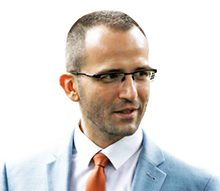On November 10th, the very next day after the US election result, the Britain in the World project hosted Professor Walter Russell Mead, one of America’s leading strategic thinkers, for a briefing on US foreign policy under President Trump.
Professor Mead is a Distinguished Fellow at the Hudson Institute, the James Clarke Chace Professor of Foreign Affairs and the Humanities at Bard College, editor-at-large of The American Interest, and award-winning author of a number of books including God and Gold: Britain, America, and the Making of the Modern World.
In his briefing, Professor Mead remarked that at the international level there is an “institutional crisis”, with a whole range of organisations — from the UN to the EU — “working less well than we expected or hoped they would be”. This had fed a crisis of legitimacy for the international liberal order, now reflected in some of Mr Trump’s rhetoric.
Based on what Trump has actually said and his record, Professor Mead identified echoes of three American presidential traditions in the President-Elect’s profile.
Firstly, there is an element of Reagan in Mr Trump. In this sense, the “intellectual case for Trump” (which Professor Mead, who voted for Mrs Clinton, picked up from a Trump supporter) is that “Trump thinks that growth is what matters; if the economy is growing fast enough then politics is going to become less bitter. International politics will also become less bitter. The best thing the United States can do for itself and the rest of the world is to grow its economy, and that is more important than any other consideration”. This echoes Reagan’s analysis, who also put growth and optimism at the centre of his vision. (The performance of the dollar since the vote seems to indicate that markets also agree that Trump’s election will lead to growth.)
Secondly, there are similarities with Franklin Delano Roosevelt in how Trump operates. He runs something “more like a court than a bureaucracy” and he “is the arbiter of everything that he wants to control”. “Trump, like Roosevelt,” Professor Mead argued, “is an intuitive thinker with strong opinions that make sense to him but do not withstand necessarily objective rational criticism from other people. But that does not phase him”.
Thirdly, and critically, Trump can also be seen to fit into the Jacksonian tradition of American presidency. Andrew Jackson was “a fiery nationalist” and hot-blooded general who was in command at the Battle of New Orleans in 1815. “The Jacksonian school in American foreign policy and American presidential leadership”, Professor Mead explained, “is populist and nationalist” and the people who voted for Andrew Jackson voted for Donald Trump. “Mostly white, not particularly rich, not particularly well educated, they think of themselves as Americans first and last”. “They do not believe in spreading democracy around the world; they are not sure that foreigners want to be like ‘us'”. According to Professor Mead, “they have a live and let live policy: ‘If you do not mess with the United States, we will not mess with you. But if you attack the United States of America we will take such a terrible revenge that you will never, ever, dream of attacking us again'”.
As to what President Trump might do in office, Professor Mead emphasised the central role that US energy independence plays in Donald Trump’s view of the world. This would allow him not just to provide blue-collar work and cheap energy prices at home, but also to use it as a geopolitical tool to undercut the revenue of potential rivals like Russia and potentially troublesome friends in the Gulf. Such a policy will “not make climate activists happy”, but “Trump has no sympathy for the global international organisations that try to micro-manage the world economy with emissions rules and other climate regulation.”
On Russia, Professor Mead remarked that there does seem to be a “geopolitical logic” to Trump’s more positive disposition toward Moscow. His point of view, Walter Russell Mead explained, “is that Russia is much less dangerous to US than China”, and we are likely to see Donald Trump at least “testing” a reverse version of Nixon’s triangular diplomacy vis-a-vis China and Russia in the 1970s.
Perhaps most important difference about Donald Trump is that “from a Jacksonian point of view, he is not as interested in international order or international norms as most presidents since the Second World War have been.” Professor Mead noted that “Trump’s thinking may be more Metternichian or Westphalian, that actually things like ‘international order’ are fancy slogans”. He is “clearly not going to be as concerned with human rights or international law in a general way as President Obama”.
Professor Mead offered many more insights during an extensive lecture and Q&A session. Sir Nigel Sheinwald, Britain’s Ambassador to Washington from 2007 to 2012, also delivered a number of thoughtful comments.
Watch a full recording of the event here.
Press reports of the event include this article by Michael Gove for The Times, and coverage of Mead’s visit by the Daily Mail, and Reuters

